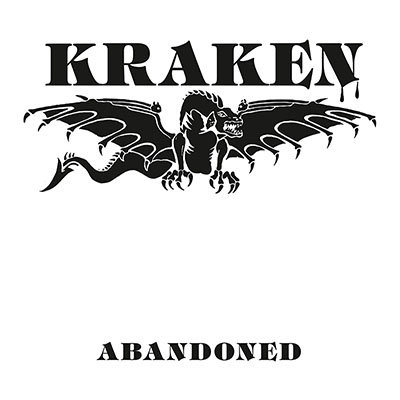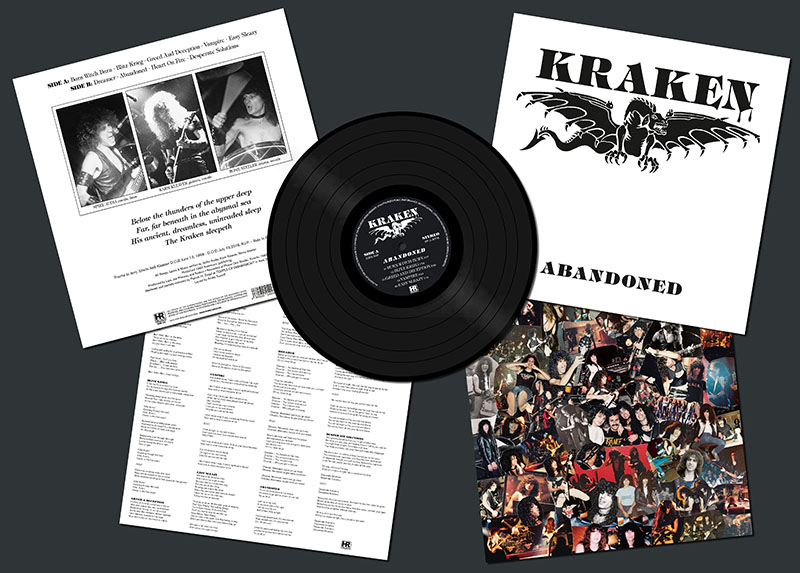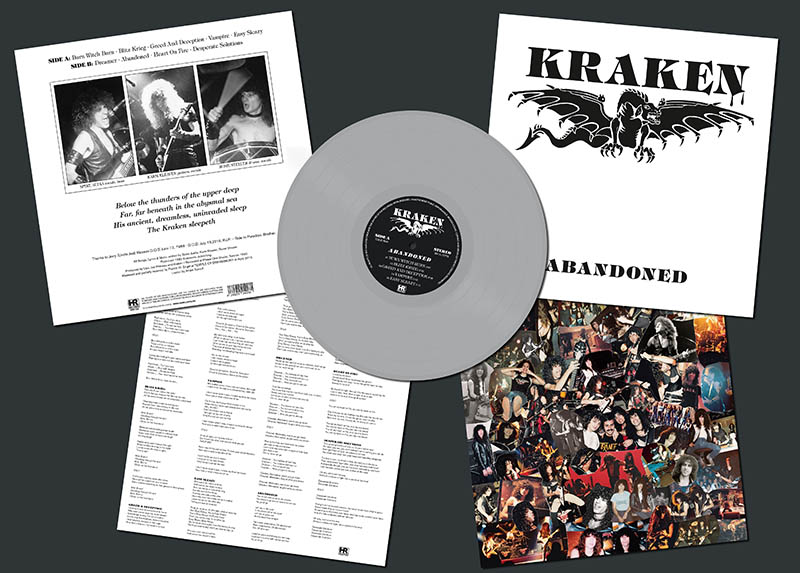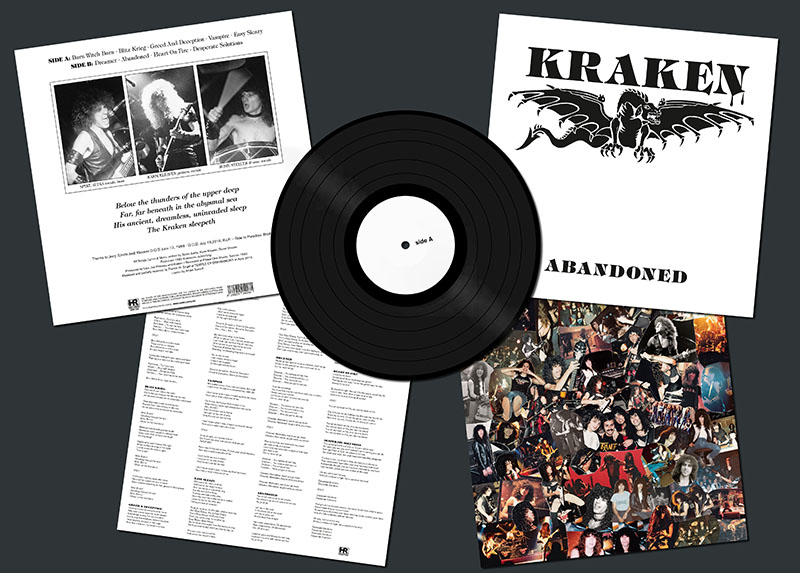 | ||||
| KRAKEN - Abandoned LP | |
HRR 508, ltd 500, 200 x black + 300 x silver vinyl, insert | |
| SPIKE AUDIA - vocals, bass KARM KLEAVER - guitars, vocals ROME STEELER - drums, vocals | |
| 01 Burn Witch Burn 02 Blitz Krieg 03 Greed and Deception 04 Vampire 05 Easy Sleazy 06 Dreamer 07 Abandoned 08 Heart on Fire 09 Desperate Solutions | |
| black vinyl SOLD OUT! silver vinyl AVAILABLE | |
Kraken from Toronto in Canada were, at the time, closely associated with the legendary Anvil. Although Spike Audia (bass, vocals), Karm Kleaver (guitars) and Rome Steeler (drums) did not manage to issue a single official vinyl release back in the glory days of heavy metal – the eighties – fans nevertheless regarded them as a minor underground legend. Due to Lips championing the cause of Kraken, the band was able to cut a demo with the help of one Chris Tsangarides in 1981. A short while later, Lips himself took Kraken under his wings and produced another set of songs.
However, this did not lead to a proper record contract, as the band had hoped for. Ultimately, this demo was heavily bootlegged on vinyl in 1989, enriching the criminal (European?) manufacturer but leaving the band penniless.
Kraken’s history is a shattering tale of bad luck and missed opportunities. It all began way back in the mid-1970s. Original bassist/vocalist Spike Audia starts at the very beginning to give us the whole story: “Five years prior to Kraken, in 1975, the spark began when Karm Kleaver was inspired after seeing Michael Schenker with UFO. Karm Kleaver and Rome Steeler were neighbourhood friends who had a common goal: to play and write heavy rock music. Once upon a long time ago as one morning Karm was walking to school, discovered an electric guitar (a Harmony Stratotone) tossed in the trash in front of a house, ready for the disposal truck pick-up. Karm, excited at seeing it, grabbed it and went straight to Rome's house. Karm figured out how to wire it into the family record player and used that as an amplifier. Rome had borrowed a set of drums from a friend, and they started to jam without realizing that they both just skipped a whole day of school. They were practising every day after school and sometimes during school. Rocking, playing copy tunes, writing songs. As their creativity began to sprout, they found themselves looking for other musicians to enjoy their passion and vision. On the other side of town, Spike Audia, at 13, was already gigging with corporate event bands. Playing and promoting his own band for weekend dances and social events. He played with various local musicians in various bands in many styles. In 1975/76, Spike was studying classical bass via correspondence with the University of Miami Music and attended at Humber Collage in the music programme 1978. Later that year, he went on the road with a band called Truth, for a year and half, before answering his calling with Karm and Rome. In the spring of 1980, in Toronto, Canada, Kraken formed with, Karm Kleaver, Rome Steeler and Spike Audia. The band practised day and night, becoming tighter with each practice. Karm and Rome did most of the singing it those days. A couple of months of not finding anyone to sing, Spike asked the guys to play ‘Tush’, a ZZ Top tune, and decided to sing. It was mind-blowing, Spike wasn't sure of talking on the great task of singing, but of course Karm and Rome convinced Spike and supported what was required to do, and the rest is history. Throughout the 1980s, Kraken was one of a handful of original metal bands constantly touring Ontario and Quebec. When there was no work, they rented a studio and began writing, practising seven hours a day. That's all Kraken did full-time, relentlessly practising and playing shows every day honing their respective talents for a solid six years! The band was becoming a name in the metal underground and was doing well. In 1981, Kraken sneaked into Phase One recording studio with the help of Anvil and Chris Tsangarides and recorded the infamous live off the floor tape, later also known as »Kraken Underground 1980-1983«. It was to be used as Kraken's profile package for record companies. Kraken almost sealed a deal with Warner, but four weeks later Warner decided ‘not to go in that direction’. Frustrated with the disillusioned corporate bullshit, Kraken, in late 1982, decided to record their first LP with $ 5,000.00 from a government grant plus another $ 5,000.00 of studio time from Phase One recording studios. With a possible deal with Anthem Records and their management, Kraken also had another alley to make this LP a reality: It was Lips of Anvil himself. It was a big boost for Kraken: Kraken is doing an album with Lips. They had toured together for close to a year and a half and really enjoyed the Anvil experience. Lips understood and believed in the Kraken dream and it was great having him as our producer, mentor. There was a great vibe and spirit that Lips captured on the two-inch tape, with the help of engineer Joe Primieau. It felt as though the gods were granting us new life. We were all pleased with the project. It took us three weeks to record and get a rough mix, it was never completed, we needed another week for the real mix. Fortunately, we mixed some effects to the vocals and guitars, and gave it a balanced overall sound. We would love to get a hold of the original masters but they were destroyed many years later in a fire. Fortunately, Spike had an original tape that was never played and was kept in a very safe place. Transferred to a CD, the quality still sounds great. From 1984 to 1986 Kraken kept rocking fans and recording new material working with the likes of Carl Dixon (guitar and lead vocals) of Coney Hatch, who produced a 4-song demo tape with more of a commercial flair but even with that, it felt like Kraken was cursed and will never take flight. We received great energy and love from fans in Europe, North America and even Japan but it failed to be recognized by the record companies. 1986, frustrated and disillusioned again after being so close for that dream, Kraken decides to go their separate ways for a while, till in 1993 a fan in Europe took it upon himself to produce a limited edition coloured vinyl album of the Kraken. Unknowingly, the band members were hearing from hard-core metal fans worldwide via letters and now e-mails that the Kraken album was out. The boys could not believe that a demo tape had created such a buzz on Kraken.”
As mentioned earlier on, Kraken were close friends of Anvil. How close? Spike Audia takes over the story: “Karm and Rome already had a special relationship with Lips and Robb, years before Kraken was formed, from living in the neighbourhood and attending the same high school. I myself was introduced to Lips and Robb months after forming Kraken, and we became very close friends with Anvil. From 1980 to 1983, Kraken regularly opened for Anvil on many of their tours across Ontario and Quebec, their fan base became Kraken's fan base. Sometimes the promoter was unaware that we were to open for Anvil, and was pleased that another band was playing in the venue. As both bands were on the road, there was some free time, a lot of the times Karm and Lips would be jamming in hotel rooms and do what guitar players do, they feed off each other, talking shop, experimenting their crafts, and at times a riff or a song has been inspired. That relationship was not only limited to just Karm and Lips but it was a special bond with all the guys and with each other, and the adventures we all had back then on the road.
Karm and I still have a strong relationship, with the old Anvil (before the movie) and the new Anvil, meaning all past and present members. We have been friends for a long time, some fans may not know this, but if you go onto page 91 in ‘The Story Of Anvil’ book, there is a picture of Dee Snider of Twisted Sister, manager David Krebs, and also Robb Reiner, wearing a Kraken ‘1982 The Curse Tour’ shirt. Robb was a big fan from the start. At times, I have travelled long distances to see them play, and party, if it's in Detroit, to Moncton, N.B., to London. When I have a chance to see them, I just call Robb and tell him ‘surprise I'm here at the gig’, they both get a blast from it. Lips and Robb are both my brothers, I have known them both well for over 35 years now. I do enjoy watching their success, friends never chock each others dreams, when we get together a couple of times a year, whether at a show, or an outing, we just have a blast, we just don't get enough time to enjoy each others company.”
The »Abandoned« album has been produced by Lips. Rumours say that there was half a day studio time left over for Anvil’s »Forged In Fire« album and that’s when Kraken recorded the nine tracks. Is that rumour true at all? “Let's put that rumour to rest,” answers Spike. “When »Forged In Fire« was being mixed at Phase One Studio by Chris Tsangarides, Chris had an Idea and suggested to Lips and Robb how to help Kraken get a demo and get signed to a label. And since the studio was already paid for another two days I think, it was possible to do it, so a plot was hatched to sneak us into the studio late at night for about five to six hours and record a live demo off the floor. Recording Kraken with Chris was a real honour for us, he worked with the biggest names, and having his name associated with Kraken, it should have had some considerable weight to present to record labels and the music biz. Chris really liked the band and wanted to help us score a deal. Lips and Robb wanted to help us, it felt like things were going to happen for Kraken. That tape later became Kraken's »Underground 1980-1983« CD, with added songs from a 1980 tape.”
How did Lips interpret his role as a “producer”? Did he contribute any guitar parts at all to the shelved album? “Lips' contribution to the »Abandoned« album was so valuable,” says Spike Audia. “I mean, he believed in us right from day one, both Lips and Robb were very supportive with what we where trying to achieve. I mean, I wish we had more time to really give it a true mix, Lips' experience regarding sound quality and tones was really important, harmonizing, and tightness was also important along with that critical ear. Lips squeezed the juice out of us, and got results. We were very pleased with the outcome, and when Karm was laying guitar tracks, Lips, like a good producer would, asked to try a smoother riff, or try harmonizing, some harmonics, after we laid the bed tracks. And I would stay overnight at Lips’ place, talking about vocal parts, singing, trying it one way or the other, talking about just the whole production of what had to be done, before, during, and after it was completed. It was a challenge.”
»Abandoned« was quite heavily bootlegged in various vinyl colours in 1989. It was widely available here in Germany. How did this bootleg come about? Does the band have any idea at all? “In 1993 Anvil just finished a European tour,” begins Spike Audia, “and upon returning, I get a call from Robb talking about the tour, the guys, the fans, and so on .. and Robb tells me that there was a Kraken vinyl album … there was total silence on the phone and I just yelled out: ‘WHAT?’ ‘Ya’, Robb says, ‘and in five different colours’. I say it again: ‘WHAT?’. ‘Ya’, he says again, ‘it was selling at some open air festivals Anvil was gigging at, ‘you guys are an underground hit.’ ‘WHAT?’ I could not believe what he was telling me, I asked him how can we be well-known, selling an unauthorized Kraken album at shows, and no one has seen us play but wanting us to go to Europe? Maybe there is a demand after we disbanded, it took another three years after that, when I actually saw a colour Kraken vinyl album on the internet, and from what I have been hearing from some fans that it sounds so bad. The record company never had the decency to contact Kraken. Kraken has never been compensated with any kind of licensing fees or any kind of any royalties, or even free copies of each colour from the record company, from that unauthorized project. I believe the bootleg contains four or five songs that never made it on the »Abandoned« CD. I believe other songs that made the cut would be on it.”
The bootleg release from 1989 had a very bad sound indeed. And according to Spike Audia this is the reason why: “That 1989 bootleg was from a copy of a copy of the cassette tape that was distributed in the metal underground scene. A European fan took it upon himself and made a vinyl out of it, and without permission … from what I hear is those coloured vinyls are worth upwards of $ 465.00 at auctions and without any autographs, it sounds horrible. I wonder if it was autographed by Kraken, would it be more valuable? The original 2" reels were destroyed by fire, fortunately I had saved a copy of the masters onto tape, and stored it in a safe place. Knowing that an unofficially vinyl of Kraken was out there, it was not a true representation of who we were, we had to reissue »Abandoned«.”
There was a British band called Kraken around as well, who did issue a very sought-after 7”single in 1980. Were the Canadian Kraken aware of that fact? “I would assume by now that in every country there would be at least one Kraken band,” says Spike Audia. “Here in Canada there's three bands with the same name, if not more, one in Columbia, which at times get confused with us when looking for our band on the web, so we say Kraken Canada, so as the real die-hard fans can find us.”
Stylistically, Kraken’s material ranges from songs like “Blitz Krieg” and “Burn Witch Burn” to “Easy Sleazy”... quite a diverse mixture of styles. Spike Audia: “Looking back now when Kraken was able to play 4 - 45 minute sets, seven days a week, it was a very good exercise in song building. We get to experiment with new songs live. The new fans that come to see never heard how the songs are written, to them it’s the first time, and so we played it at times in different tempo or feel, changing structures of the song, and how much power was needed to effectively rock the crowd, till it was time to go to the studio. Stylistically, our songs range from grunge feel such as ‘Blitz Krieg’ to ‘Burn Witch Burn’, which I say is aggressive speed metal, and it was recommended by a fan, that if your in the love making mood, you may want to listen to ‘Easy Sleazy’ while doing it ... but seriously, isn't that the essence of a complete heavy album when there is many styles, with various speeds, grooves and chops, one can appreciate the ingredients of heaviness...?”
Matthias Mader


